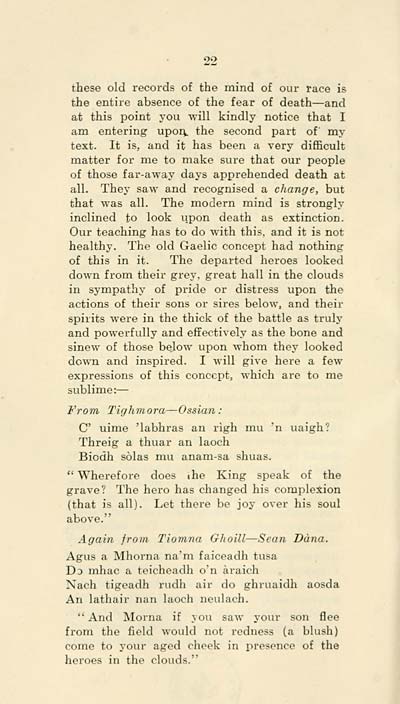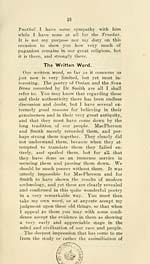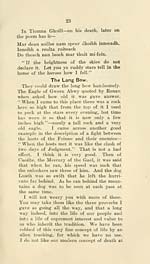Download files
Complete book:
Individual page:
Thumbnail gallery: Grid view | List view

22
these old records of the mind of our race is
the entire absence of the fear of death — and
at this point you will kindly notice that I
am entering uporv. the second part of my
text. It is, and it has been a very difi&cult
matter for me to make sure that our people
of those far-away days apprehended death at
all. They saw and recognised a change, but
that was all. The modern mind is strongly
inclined to look upon death as extinction.
Our teaching has to do with this, and it is not
healthy. The old Gaelic concept had nothing
of this in it. The departed heroes looked
down from their gi'ey. great hall in the clouds
in sympathy of pride or distress upon the
actions of their sons or sires below, and their
spirits were in the thick of the battle as truly
and powerfully and effectively as the bone and
sinew of those below upon whom they looked
down and inspired. I will give here a few
expressions of this concept^ which are to me
sublime: —
From Tighmora — Ossian:
C uime 'labhras an righ mu 'n uaigh?
Threig a thuar an laoch
Biodh solas mu anam-sa shuas.
" Wherefore does the King speak of the
grave? The hero has changed his complexion
(that is all). Let there be joy over his soul
above."
Again from Tiomna Ghoill — Sean Dana.
Agus a Mhorna na'm faiceadh tusa
Dd mhac a teicheadh o'n araich
Nach tigeadh rudh air do ghruaidh aosda
An lathair nan laoch neulach.
" And Morna if you saw your son flee
from the field would not redness (a blush)
come to your aged cheek in presence of the
heroes in the clouds."
these old records of the mind of our race is
the entire absence of the fear of death — and
at this point you will kindly notice that I
am entering uporv. the second part of my
text. It is, and it has been a very difi&cult
matter for me to make sure that our people
of those far-away days apprehended death at
all. They saw and recognised a change, but
that was all. The modern mind is strongly
inclined to look upon death as extinction.
Our teaching has to do with this, and it is not
healthy. The old Gaelic concept had nothing
of this in it. The departed heroes looked
down from their gi'ey. great hall in the clouds
in sympathy of pride or distress upon the
actions of their sons or sires below, and their
spirits were in the thick of the battle as truly
and powerfully and effectively as the bone and
sinew of those below upon whom they looked
down and inspired. I will give here a few
expressions of this concept^ which are to me
sublime: —
From Tighmora — Ossian:
C uime 'labhras an righ mu 'n uaigh?
Threig a thuar an laoch
Biodh solas mu anam-sa shuas.
" Wherefore does the King speak of the
grave? The hero has changed his complexion
(that is all). Let there be joy over his soul
above."
Again from Tiomna Ghoill — Sean Dana.
Agus a Mhorna na'm faiceadh tusa
Dd mhac a teicheadh o'n araich
Nach tigeadh rudh air do ghruaidh aosda
An lathair nan laoch neulach.
" And Morna if you saw your son flee
from the field would not redness (a blush)
come to your aged cheek in presence of the
heroes in the clouds."
Set display mode to: Large image | Transcription
Images and transcriptions on this page, including medium image downloads, may be used under the Creative Commons Attribution 4.0 International Licence unless otherwise stated. ![]()
| Early Gaelic Book Collections > Ossian Collection > Gaelic concepts of life and death > (30) |
|---|
| Permanent URL | https://digital.nls.uk/79283928 |
|---|
| Description | Selected books from the Ossian Collection of 327 volumes, originally assembled by J. Norman Methven of Perth. Different editions and translations of James MacPherson's epic poem 'Ossian', some with a map of the 'Kingdom of Connor'. Also secondary material relating to Ossianic poetry and the Ossian controversy. |
|---|
| Description | Selected items from five 'Special and Named Printed Collections'. Includes books in Gaelic and other Celtic languages, works about the Gaels, their languages, literature, culture and history. |
|---|

